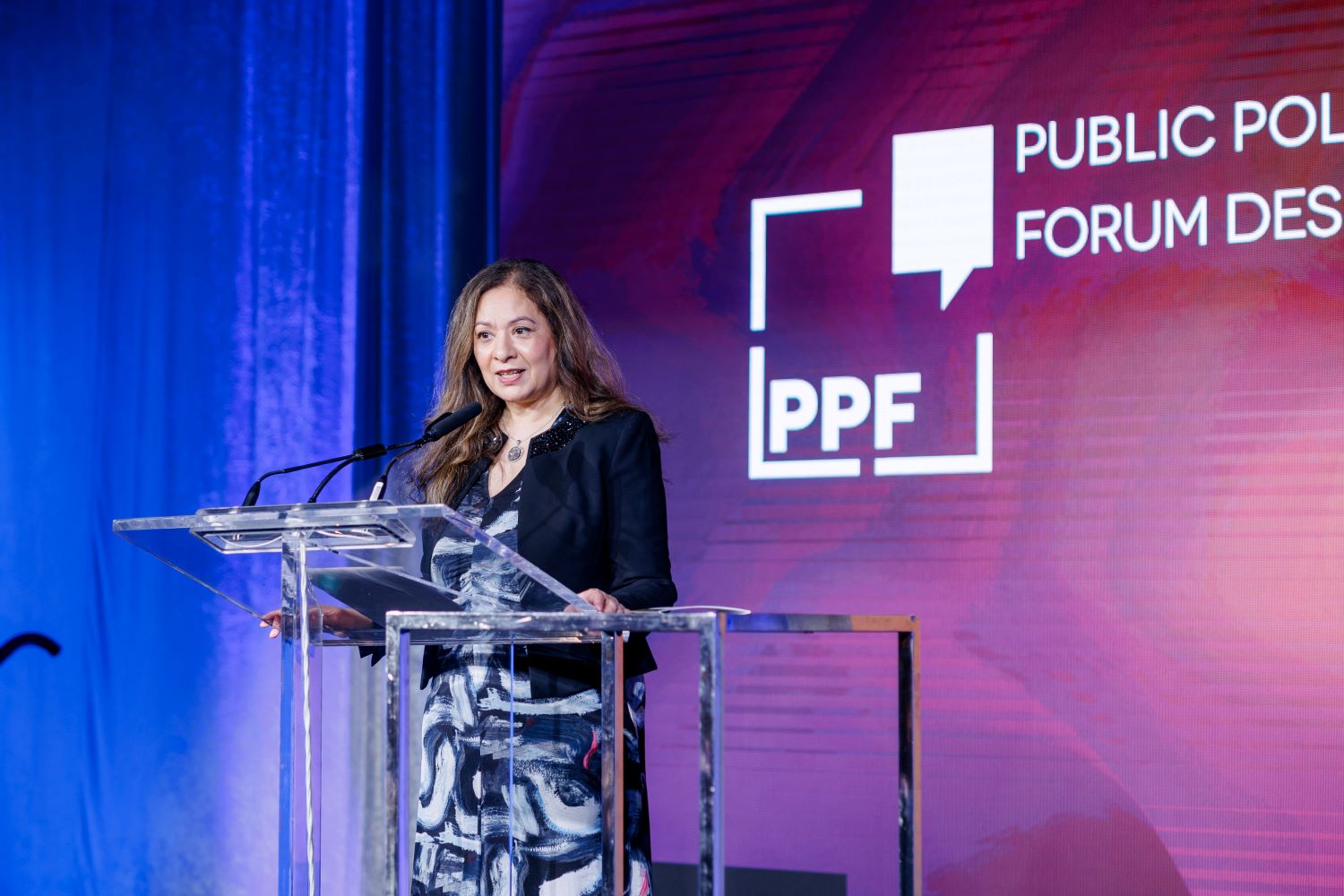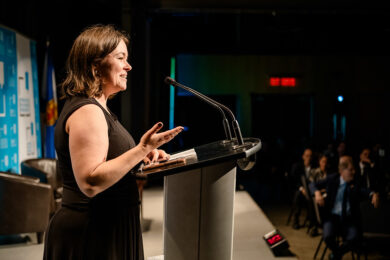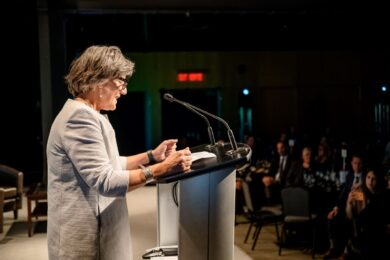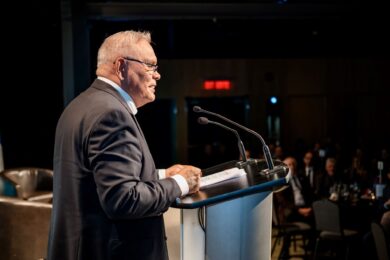
Inez Jabalpurwala: ‘Let’s set bigger tables, tell better narratives and have broader impact’
Inez Jabalpurwala, President and CEO of the Public Policy Forum, delivered the following remarks at the 2025 Testimonial Dinner, where PPF honoured the contributions of six Canadians to public policy: Alfred Burgesson, Steve Paikin, Chief Crystal Smith, Marc-André Blanchard, Anil Arora and Elizabeth Dowdeswell.
Read and watch her full speech below. Plus, read more Testimonial Dinner speeches from our 2025 honourees and watch their speeches here.

I want to thank all of you for joining us for this inspirational evening, to celebrate, to reconnect with friends, and to make new contacts. I want to have a special call-out to the members of the Public Policy Forum team who worked so hard to make this evening a success: Chantal, Chanelle and Kelly Cyr, who has been with us for 25 years. I think that deserves a round of applause.
I also want to thank and recognize our dedicated Board of Directors, led by our Chair, the wonderful André Beaulieu. Merci à vous tous de vous être joins à nous pour cette soirée inspirante, une soirée qui nous permet de célébrer et de nous retrouver entre amis, et de nouveaux contacts. J’aimerais remercier les membres de l’équipe du Forum des politiques publiques qui ont travaillé si fort pour assurer le succès de cet événement. Ainsi que les membres dévoués de notre conseil d’administration, sous la direction de notre président du conseil, le merveilleux André Beaulieu.
Every successful professional journey is a combination of hard work, luck and who you meet along the way. I was lucky that in 2001, I met two of Canada’s greatest leaders: Allan R. Taylor and the late Michael H. Wilson. Both were previously honoured by the Public Policy Forum — Allan in 1994 and Michael in 2005. And so, tonight feels full circle for me. I worked closely with Allan and Michael for nearly two decades to build an organization that brought together a fragmented brain health ecosystem and made the case for supporting brain research the way we support cancer and cardiovascular research.
Brain health is more than the absence of a disease or disorder and is central to our economic and social prosperity. The brain does not exist in isolation — it’s impacted by the rest of the human system and by the external environment. Advancing brain health led me to lots of intersecting areas: big data and AI, climate change and pollution, differences in socioeconomic backgrounds and their link to health outcomes, and productivity in knowledge-based economies, just to name a few.
In 2020, I joined Ken Irving on an exploration of the potential brain health impacts of Covid-19. And this led to patient-linked policy work on long Covid. When Michael was alive, I never got to tell him a secret that I’m going to share with you tonight: that I always aspired to be a policy wonk, but one who believed in Edison’s timeless words, that vision without execution is hallucination.
Good policy is more than more than just ideas on a shelf in an office in Ottawa. It was Michael and Allan who inspired me to understand three things which connect to actionable policy.
First, if you want to have lasting and meaningful impact, you need to work across party lines and recognize that people enter public service because they love their country and want to do the best for its citizens. Perhaps there are differences in the vision to get there but in these increasingly polarized times, I hope it is recognized that sometimes those differences on the things that really matter are more exaggerated than the reality.
Second, if you want policy to be implemented, you have to be a catalytic leader. You have to engage with and connect with people across sectors and provinces, and with all communities, urban, rural and northern, because that’s where the rubber meets the road. Great ideas fall apart on execution because that work to build trust wasn’t done.
And third, if you want to serve people, you need to take a dragonfly-eye approach of seeing with breadth and depth, to listen and understand difference perspectives even and especially when they don’t agree with your own. Although Michael was a numbers man, he always understood that data was necessary but it’s not sufficient. People are moved by stories. His own family story moved many people to bring mental health out of the shadows. You always have something else to learn from others, but more important, as soon as you lose sight of who you’re serving by talking around and about them, you will never be able to do right by them.
Now, just over three months into my role as President and CEO of the Public Policy Forum or PPF, I find myself reflecting with gratitude on how I got here and the wisdom that was so generously shared with me. I’m impatient to put all of this into practice. I’ve had good conversations with many of PPF’s valued members, partners and supporters. I’m listening. And I’m looking forward to working with you, because collaboration is a guiding principle for me and for PPF.
Now let’s just say that we’re living in interesting times of poly-crises. Wars, numerous civil conflicts, elections in 72 countries in 2004 including, you may have heard, the United States, involving almost half the world’s population. This has profoundly impacted the political, social and economic landscape of our world. Single-path, short-term solutions are no longer sufficient. Canadians are energized by a moment of coming together but also a moment of anxiety about what’s ahead. A time, to borrow a Canadianism, to “double double” on our strengths and our assets; a time to focus on getting things done and getting things built. But we have to balance the here and now with the long view, because change rarely happens as fast as we’d like and most often happens over one or more election cycles.
We’re also living in a time of shrinking civic spaces and an erosion in the belief in evidence as the basis to drive policy, practice and to influence decisions and behaviours. AI tools are being used to generate and spread misinformation and disinformation. And programming biases embedded into the development of these tools and the available data driving them may compound existing socioeconomic, racial and gender inequalities.
As the media landscape changes and we’re overwhelmed by information and opinions in a marketplace of ideas, objectivity and the truth have become more difficult to discern. What has been called information pollution, where we have to wade through a lot of bad to get to the good parts. It’s even more important to make PPF’s work accessible to a broader audience.
One early way that we walked the talk on actionable policy is by launching a non-partisan grant program to support journalists based at small- and medium-sized media outlets in order to enable varied perspectives and more fulsome coverage of the 2025 federal election. Covering Canada was launched just one week after the election was called, in partnership with the Rideau Hall Foundation and Michener Awards, with funding provided by a range of donors. We’ve raised and dispersed more than $500,000 dollars to this program, with additional funds to produce a post-election report on journalism in a campaign context. This is part of our broader work on journalism and democracy.
This country gave my parents every opportunity to build a life and they, in turn, gave me every opportunity to thrive. That’s what I want for every Canadian, whether Indigenous to our land, many generations here, or recently arrived. Good policy is a critical part of that. It’s also part of looking outward, as my friend Robert Greenhill would say, to where Canada can be consequential on the global stage.
Over the next months, the Board and team at PPF will be undertaking a priority-setting exercise to determine our areas of focus and where we can bring unique value as a convener and thought and action leader. Our work will be informed by extensive consultation, with a view to finding ways to collaborate with other think tanks and across sectors. And so, my call to action to my team and to you is let’s set bigger tables. Let’s tell better narratives, and let’s have broader impact. Bigger, better and broader.
Tonight, we celebrate some great Canadians who have done all of these, and have shaped policies informed by their diverse perspectives, have told compelling stories of a future vision, and have changed paradigms to serve Canadians. Amanda will be providing more fulsome tributes but let me recognize now: Elizabeth Dowdeswell, Anil Arora, Marc-André Blanchard, Chief Crystal Smith, and Steve Paikin.
And now, it is my great pleasure to introduce our Emerging Leader, Alfred Burgesson, a young Nova Scotian who saw an opportunity for other young BIPOC entrepreneurs in his province and founded the Tribe Network, who is poised to launch a $20 million fund. Alfred’s entrepreneurial ambition has transformed the business landscape for racialized people across Canada. He is a strong influence for inclusive economic development and community empowerment. He also has a unique story. Alfred and his family immigrated from Ghana, west Africa, to a small town in Nova Scotia when he was only six years old. Just imagine the resilience that it took to navigate a new culture. But he did more than just navigate. Alfred also had the ambition to seize opportunities and the courage to become a changemaker. Alfred founded Tribe Network four years ago with one goal: to create a space where racialized people could find support, resources and a sense of belonging. What began as a journey to find his tribe as grown into a thriving Halifax-based organization that now has over two thousand members. When he first inquired about support for his digital media company at an innovation hub, Alfred fell out of place. That led him to create the environment that he needed. Today, Tribe Network occupies two floors in a heritage building in Halifax, offering a cozy community where members can work, network, access technology and receive mentorship.
Alfred’s vision extends far beyond Nova Scotia. He’s building a self-sustaining global network with plans to support entrepreneurs with grants and significant venture investments. His determination has already attracted substantial investment and he’s well one his way to raising his goal of $20 million. In a time when the importance of equity, diversity and inclusion is being questioned, Alfred stands firm in his belief that EDI is not a side project but a framework in the right direction for positive change. We need young leaders like Alfred to come to the table. At PPF, there are no adult and children’s tables. It’s one big table with room for voices that are sometimes absent from our conversations about our collective prosperity and the pathways to get there.
Ladies and gentlemen, please join me in honouring Alfred Burgesson.
Hear from our 2025 Testimonial Dinner honourees:
- Alfred Burgesson, founder and CEO of Tribe Network, winner of the 2025 Emerging Leader Award
- Chief Crystal Smith, leader of the Haisla Nation
- Steve Paikin, renowned journalist and longtime host of The Agenda on TVO, winner of the 2025 Hyman Solomon Award for public interest journalism
- Elizabeth Dowdeswell, the longest-serving lieutenant-governor of Ontario
- Marc-André Blanchard, Executive Vice-President of CDPQ Global and former diplomat
- Anil Arora, former chief statistician at Statistics Canada





